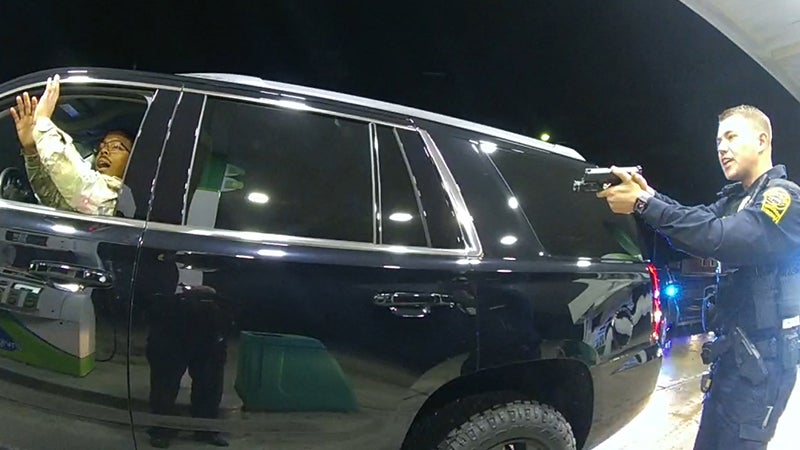Lawsuit against officers who held Black motorist at gunpoint set for Jan. 9 trial
Published 4:18 pm Tuesday, September 27, 2022

- Officer Joe Gutierrez’s body cam footage shows Officer Daniel Crocker holding uniformed Army 2nd Lt. Caron Nazario at gunpoint during a traffic stop at the BP gas station on Route 460.
Prospective jurors to receive questionnaires by mail
A federal judge has set a new trial date of Jan. 9 for Army 2nd Lt. Caron Nazario’s lawsuit against Windsor Police Officer Daniel Crocker and ex-officer Joe Gutierrez.
The matter was originally to go to trial March 28 of this year, but was delayed at Crocker’s and Gutierrez’s request pending the court’s decision on whether either officer could invoke “qualified immunity,” a federal legal doctrine that shields police officers from most misconduct lawsuits.
U.S. District Judge Roderick C. Young ruled in August that Crocker had “probable cause” to pull Nazario over the evening of Dec. 5, 2020, but that qualified immunity did not shield Crocker from liability for having illegally searched and removed a firearm from Nazario’s car.
Nazario’s lawsuit accuses the two white officers of racially motivated police brutality for having held the Black lieutenant at gunpoint while they shouted conflicting commands at him to keep his hands out of his car’s window and exit the vehicle. Video footage of the incident, which went viral online in April 2021 and led to Gutierrez’s firing, culminates with Gutierrez repeatedly pepper-spraying Nazario and using knee strikes to force the lieutenant out of the car and onto the ground.
Crocker had pulled Nazario over for allegedly lacking a rear license plate. Gutierrez responded to the scene when Crocker reported a “felony traffic stop” to dispatchers. Nazario had a temporary New York plate taped to the inside of his car’s rear window, but the officers said they didn’t see it and accused the lieutenant of eluding police for having driven roughly a mile down Route 460 to a BP gas station before stopping.
In his qualified immunity ruling, Young upheld Crocker’s and Gutierrez’s use of the doctrine as a defense to Nazario’s federal claims that the officers had used “excessive force” and infringed on his free speech right by threatening to arrest him and inform his Army superiors if he didn’t “let this go.” Young, however, allowed Nazario’s state-level “assault and battery” and “false imprisonment” claims to move forward to a jury trial, noting Virginia has “sovereign immunity” rather than “qualified immunity” for police, which shields officers from negligence claims but not intentional wrongdoing.
The Jan. 9 jury trial, per Young’s order, is expected to last five days.
Young issued another order on Sept. 26 stating that “given the amount of pretrial publicity” surrounding the case, the court “will depart from the usual practice” of empaneling the jury by questioning the prospective jurors as a group, with each party having the option of striking a juror.
Instead, the court will mail prospective jurors two questionnaires, one pertaining to the case and the other pertaining to COVID-19. Attorneys representing Nazario, Crocker and Gutierrez have until Oct. 17 to request certain questions be eliminated, or request additional questions be posed to the prospective jurors. Each party will then have until Oct. 24 to file objections to the other parties’ proposed questions and eliminations.
The questionnaires will be mailed Nov. 7 and be due back to the court by Nov. 28. Copies of the responses will be provided to each party by noon on Nov. 29. The parties then have until Dec. 7 to file a joint statement on which jurors should be struck for cause. Those who remain will be required to appear for jury selection on Jan. 9.
The case questionnaire instructs prospective jurors to “not research or read anything whatsoever” about the case or its parties “until you are excused from service in this case.” The prohibition includes listening to any news reports or other television or radio broadcasts pertaining to the case or its parties. The questionnaire further prohibits prospective jurors from discussing the case or expressing their views on the matter, to include a prohibition on posting to social media “about any aspect of your jury service, this questionnaire, or the parties or entities identified in this case.”
The questionnaire asks prospective jurors to provide their names, age and gender, but not race. Among the case-specific questions are, “Have you had any interactions with law enforcement officers or the courts that led you to believe that the law enforcement officer or the court was unfair to you, or had engaged in unprofessional or illegal conduct?” and “Has the media coverage related to law enforcement activity or responses to law enforcement activity affected you in such a way that you will find it difficult to be fair to all parties in deciding this case?”
Additional questions ask whether the prospective juror has had any “positive or negative contact with the Windsor Police Department” or any other federal, state or local police agency, whether he or she belongs to “any organization that advocates for either defunding law enforcement or promoting law enforcement,” and whether the prospective juror would give “greater or lesser weight to the testimony of a law enforcement officer based solely on the fact that he or she is employed as a law enforcement officer.”
The COVID-19 questionnaire asks prospective jurors whether they’ve been diagnosed with COVID-19 or work with COVID-19 patients in a health care setting, and to state their COVID-19 vaccination status.





